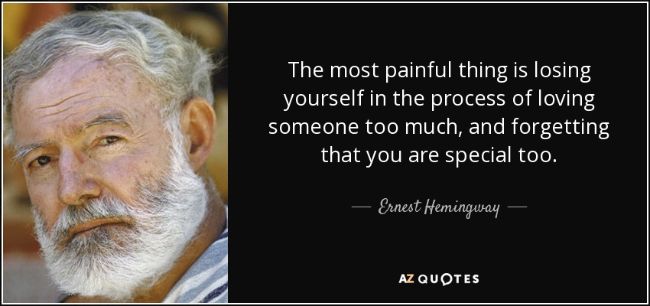[s3mvp id=’175′]
Here’s a typical day for Anna and, let’s say, little Anna. No, Anna is not pregnant. Little Anna is Anna’s inner self sitting inside Anna.
Anna makes scrambled eggs for breakfast. Her partner and kids serve themselves. Before Anna gets to breakfast, her child asks for another serving of egg. Anna gladly gives her share to her child. “I’ll manage.” Little Anna feels sad for having to go hungry.
Anna gets to work. She’s in a meeting room that feels like a freezing igloo. But Anna notices that others seem comfortable. She stays quiet about her situation. Little Anna feels sad for having to freeze.
Anna attends a conference and walks around in high heels all day. Her feet and back are in so much pain. In the seminar room, one last seat is available. Anna tells her colleague to take it. “I’m fine”. Little Anna feels sad for having her pain ignored.
Anna finishes another hectic day. It’s 9:30pm and she can’t wait to get to bed and relax her feet. Her partner offers her a glass of wine and starts chatting. Little Anna feels sad for having to trade off her much-needed rest.
Be your best friend
Imagine you had a little child sitting inside you. She’s smart, loving and powerful. But there’s only one person in the whole world who can hear her, feel her and take care of her. YOU.
You’re her only friend. No one understands her struggles as well as you do. No one understands her victories better than you. And no one understands what she needs as well as you do.

Give her at least the same priority as you give others. Do things for her the way you would for others.
Pay attention to her wants and needs. And make an effort to fulfil them.
Because here’s the thing. Sometimes when we skip self-care, we may think it’s because we’re tired or don’t have the time. But in reality, we may be doing it because we don’t think our self-care is important enough for us to make the effort.
Sometimes we may ignore what we need simply because we’re conditioned to ignore our needs.
Here are some examples.
Example #1
Patricia is really tired. As she gets a few minutes of downtime to lounge on the sofa, she wishes she could enjoy a cup of warm tea. But she’s too tired to get up and make it for herself. So she ignores it and prefers to relax instead.
Five minutes later, Patricia’s partner requests her, very sweetly, if she can make him some tea before he joins an important call.
Patricia picks herself up to do it.
Example #2
Claudia has a bad back from working on the laptop. She doesn’t have an external monitor, and working from home has aggravated her pain.
Claudia’s been meaning to buy a monitor to use at home, but she’s just not had the time to do it. She keeps suffering with her back pain for days.
As Claudia is working one day, her child runs to her asking for a coloring book set. Claudia gets on to Amazon, looks through the options, and gets him the animal set that she knows he’ll love.
But she has no time to buy her monitor.
Self-care means respecting your needs and wants
Self-care is typically more difficult and less glamorous than pampering yourself. Sure, sometimes a spa day may just be what you need to restore your energy.
But self-care is much more than that.
It’s not a list of to-dos. It’s not a set of rules.
It’s a process. A process of respecting yourself and your needs. Of learning to honor yourself in your choices, actions, and habits. A process of discovering what you, individually, need and want.
Pay attention to how you’re feeling physically and mentally. And be committed to giving yourself the help you need.
Treat yourself with love, respect and kindness. Treat yourself with at least the same compassion as you treat others. And be there for yourself just as you’re there for other people in your life.
Get in touch with your emotions
Starting to care for yourself can make you hyper aware of how you’ve treated yourself in the past or how you’ve been treated by others. It can bring out feelings of sadness, abandonment or even anger. It can bring back memories from earlier in your life when you were conditioned to numb out your needs and wants. Feelings of how you were neglected, discounted or ignored.
These are powerful emotions. And your brain, being smart, may try to avoid them by shutting out self-care altogether. Recognize that this is part of the process, and stick with it.
Don’t take out your anger on other people. Remember to act from a position of strength. Allow yourself to sit with those emotions and feel them out. Any negative emotion will eventually disappear if you feel it long enough.
In fact, feeling those emotions out is itself a huge part of self-care.
Releasing those feelings allows you to move forward in your life with more freedom, clarity, and happiness. It’s part of healing and growth.
So go through the process. Work through and release the painful emotions. And experience how amazing it can feel when you get to the other side. Oooh! Well done.
“Accept yourself. Love yourself as you are. Your finest work, your best movements, your joy, peace, and healing comes when you love yourself. You give a great gift to the world when you do that. You give others permission to do the same: to love themselves. Revel in self-love. Roll in it. Bask in it as you would sunshine.” — Melodie Beattie
Here’s Hailee Steinfeld with “I love me, gonna love myself” for a pick-me-up! Enjoy!
[gravityform id=”363″ title=”false” description=”true”]

